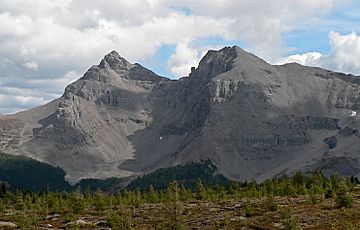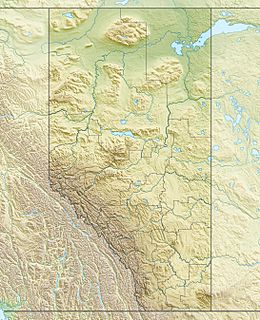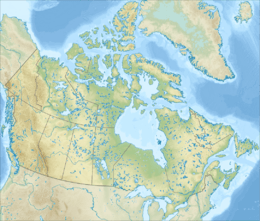Mount Howard Douglas facts for kids
Quick facts for kids Mount Howard Douglas |
|
|---|---|

Mount Howard Douglas seen from the west
|
|
| Highest point | |
| Elevation | 2,877 m (9,439 ft) |
| Prominence | 632 m (2,073 ft) |
| Listing | Mountains of Alberta |
| Geography | |
| Location | Banff National Park Alberta, Canada |
| Parent range | Canadian Rockies |
| Topo map | NTS 82O/04 |
Mount Howard Douglas is a tall mountain in Banff National Park, Alberta, Canada. It stands about 2,877 meters (9,439 feet) high. This mountain is found right next to the Banff Sunshine ski resort.
The mountain is named after Howard Douglas. He was a park superintendent who helped make Banff National Park much bigger. The name "Mount Howard Douglas" became official in 1958. The closest higher mountain is Mount Bourgeau, which is about 4.55 kilometers (2.83 miles) away.
How the Mountain Formed
Like other mountains in Banff Park, Mount Howard Douglas is made of sedimentary rock. This type of rock forms when layers of sand, mud, and tiny bits of sea creatures settle over millions of years. These layers harden into rock over time.
The rocks in this mountain were laid down from the Precambrian to Jurassic periods. This means they are very, very old. Later, during a time called the Laramide orogeny, huge forces pushed these rocks. They were pushed east and even slid over younger rocks, creating the big mountains we see today.
Weather on the Mountain
Mount Howard Douglas is in a subarctic climate zone. This means it has very cold and snowy winters. Temperatures can drop below -20 °C (-4 °F). With the wind chill, it can feel even colder, sometimes below -30 °C (-22 °F).
Summers on the mountain are usually mild. When snow melts or rain falls, the water flows down the mountain. This runoff eventually drains into small streams that lead to the Bow River.
Images for kids
 | Janet Taylor Pickett |
 | Synthia Saint James |
 | Howardena Pindell |
 | Faith Ringgold |




